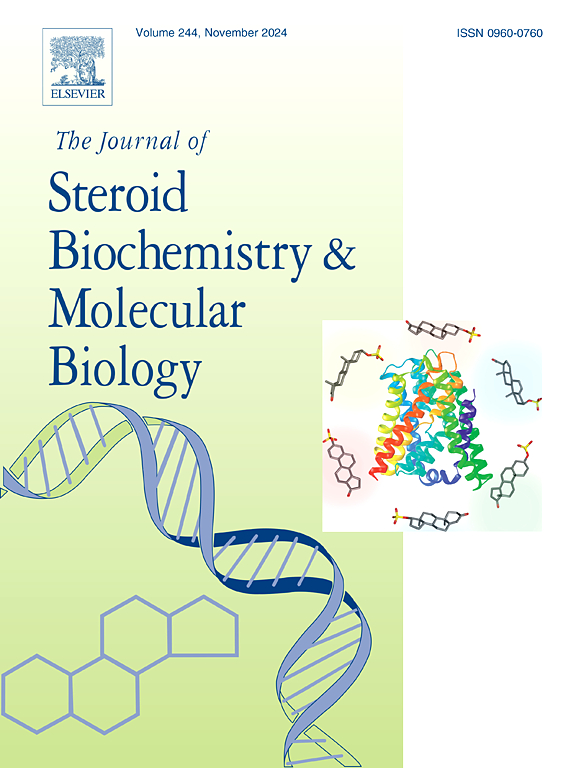White kidney bean extract improves letrozole-induced polycystic ovary syndrome in rats by regulating the Wnt signaling pathway
IF 2.5
2区 生物学
Q3 BIOCHEMISTRY & MOLECULAR BIOLOGY
Journal of Steroid Biochemistry and Molecular Biology
Pub Date : 2025-09-07
DOI:10.1016/j.jsbmb.2025.106858
引用次数: 0
Abstract
Polycystic ovary syndrome (PCOS) is an endocrine-metabolic disorder characterized by ovarian dysfunction, with limited effective treatments. This study investigates the therapeutic effects and mechanisms of white kidney bean extract (WKBE) in a PCOS rat model. A PCOS model was established using letrozole, followed by intervention with varying doses of WKBE. Serum sex hormone levels, insulin resistance, and metabolic markers were measured. Ovarian histopathology, fibrosis, and apoptosis were assessed. Transcriptomic sequencing was performed on ovarian tissues from control, PCOS, and high-dose WKBE groups. High-dose WKBE significantly ameliorated endocrine-metabolic disturbances in PCOS rats, including reduced testosterone, LH/FSH ratio, insulin resistance, and lipid abnormalities, outperforming low/medium doses. It decreased body weight, ovarian index, and organ fat deposition, repaired ovarian histopathological damage, and reduced fibrosis and apoptosis. Transcriptomic analysis revealed that high-dose WKBE altered the expression of Wnt signaling pathway-related genes, suggesting its therapeutic role may involve modulation of this pathway. High-dose WKBE alleviates endocrine-metabolic dysregulation and ovarian dysfunction in PCOS rats by regulating the Wnt signaling pathway, offering a potential novel therapeutic strategy.
白芸豆提取物通过调节Wnt信号通路改善来曲唑诱导的大鼠多囊卵巢综合征
多囊卵巢综合征(PCOS)是一种以卵巢功能障碍为特征的内分泌代谢疾病,有效治疗方法有限。本研究探讨白芸豆提取物(WKBE)对PCOS大鼠模型的治疗作用及其机制。用来曲唑建立多囊卵巢综合征模型,然后用不同剂量的WKBE进行干预。测定血清性激素水平、胰岛素抵抗和代谢指标。评估卵巢组织病理学、纤维化和细胞凋亡。对对照组、PCOS组和高剂量WKBE组的卵巢组织进行转录组测序。高剂量WKBE显著改善PCOS大鼠的内分泌代谢紊乱,包括降低睾酮,LH/FSH比率,胰岛素抵抗和脂质异常,优于低/中剂量。降低体重、卵巢指数和器官脂肪沉积,修复卵巢组织病理损伤,减少纤维化和细胞凋亡。转录组学分析显示,高剂量WKBE改变了Wnt信号通路相关基因的表达,提示其治疗作用可能与调节该通路有关。大剂量WKBE通过调节Wnt信号通路减轻PCOS大鼠内分泌代谢失调和卵巢功能障碍,为PCOS大鼠提供了一种潜在的新型治疗策略。
本文章由计算机程序翻译,如有差异,请以英文原文为准。
求助全文
约1分钟内获得全文
求助全文
来源期刊
CiteScore
8.60
自引率
2.40%
发文量
113
审稿时长
46 days
期刊介绍:
The Journal of Steroid Biochemistry and Molecular Biology is devoted to new experimental and theoretical developments in areas related to steroids including vitamin D, lipids and their metabolomics. The Journal publishes a variety of contributions, including original articles, general and focused reviews, and rapid communications (brief articles of particular interest and clear novelty). Selected cutting-edge topics will be addressed in Special Issues managed by Guest Editors. Special Issues will contain both commissioned reviews and original research papers to provide comprehensive coverage of specific topics, and all submissions will undergo rigorous peer-review prior to publication.

 求助内容:
求助内容: 应助结果提醒方式:
应助结果提醒方式:


